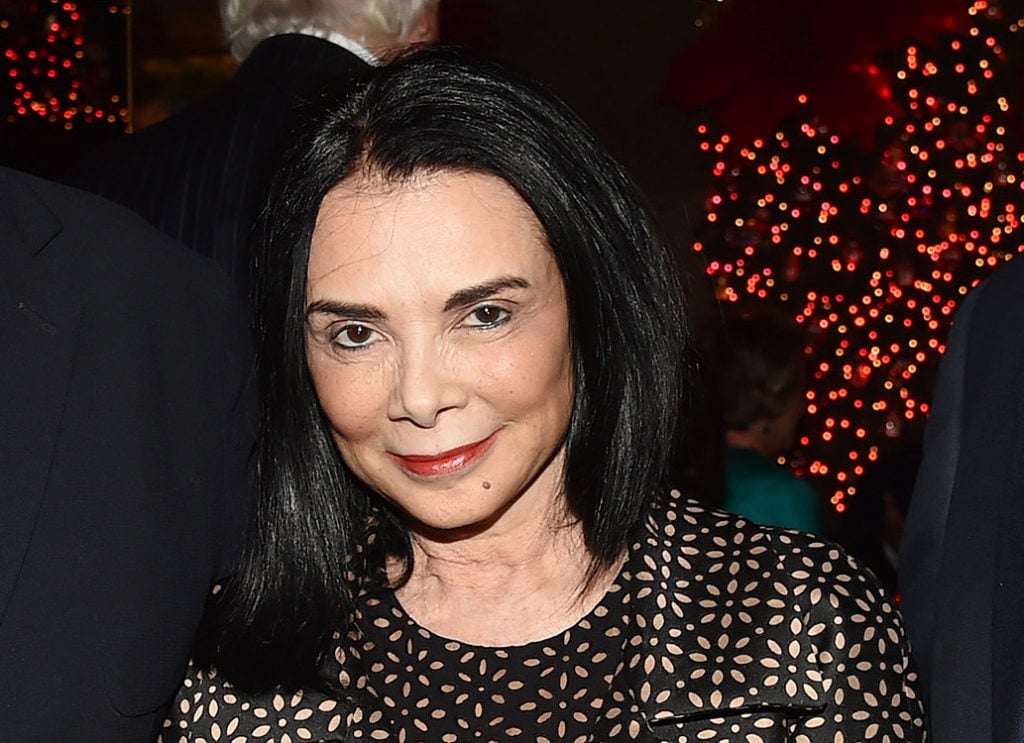Law & Politics
Veteran Art Dealer Mary Boone Is Sentenced to 30 Months in Prison for Tax Evasion
The veteran art dealer pleaded guilty to two counts of tax evasion in September.

The veteran art dealer pleaded guilty to two counts of tax evasion in September.

Eileen Kinsella

A federal judge sentenced veteran art dealer Mary Boone to 30 months in prison for filing false tax returns today in US District Court in Manhattan. She was granted up to one year of supervised release and will also serve 180 hours of community service working with New York City children.
Asked for comment on the decision, her lawyer said simply, “Disappointed.” He noted that Boone would most likely have to close her gallery, which works with artists including Ai Weiwei and Francesco Clemente. After the decision came down, Boone, dressed in a dark blue blazer, buried her face in her hands and several women in court were in tears. Her son and a number of friends embraced her in the room. Her lawyer said Boone has no plans to appeal.
The presiding judge, Alvin Hellerstein, initially said Boone should surrender within 60 days, but granted her attorney’s request for an extension, to May 15 at 2 p.m. He also allowed her attorney to request the specific prison at which the dealer will serve out her sentence, which is Danbury Correctional in Connecticut.
“The bad decisions I made have brought shame and suffering to me and my family,” Boone said in a prepared statement before the presiding judge. Describing herself as “remorseful,” Boone said that she was nervous and had written out her statement so as not to forget anything. “I wish I could undo my actions but I can’t. I’ve learned from my mistakes and I will continue to learn. I worked hard for 40 years and I stand to lose everything. I beg your honor to let me go back to work.”
The proceedings lasted just over an hour, and also included remarks from Boone’s attorney, Robert Fink, followed by a representative from the US prosecutor’s office and a special agent for the IRS. Fink spoke at length about Boone’s tumultuous upbringing, which led to later addiction and mental illness, as well as a suicide attempt. He also noted that her sister had died by suicide. “She’s a good woman who has done a bad thing,” said Fink.
Asserting that her fraudulent activity was motivated not by greed but by fear, he outlined diagnoses by various psychotherapists who deemed her “schizoid, chronically depressed, and maladapted.” Fink added that Boone, who was under investigation for more than six years by the government, had become “socially ostracized,” including being kicked out of the Century Club, the Art Dealers Association of America, and dropped as a client by Chase Bank. As a result, he said, she had already suffered enough and should be treated with leniency. He suggested the judge sentence her to house arrest as opposed to incarceration.
“Instead of truthfully reporting her taxes, time and time again, year after year, Ms. Boone chose to evade them,” the prosecutor said. “These were not abstract activities. She chose to flout the tax laws with intentional and willful violations that she had to know were wrong.” The prosecutor repeatedly referred to Boone’s behavior as “egregious” and “continuous.”
The prosecutor outlined specifics of Boone’s crimes: counting personal expenses as tax deductible business expenses, using her gallery business to pay for her son’s education, paying no taxes at all in the years 2009 and 2010, and paying just over $300 in taxes in 2011 (when the actual tax bill was $1.2 million). Boone also collected New York State sales tax from clients “and kept that money and did not turn it over to the government,” she said.
“While the government is sensitive to mental health issues and other issues, there is no excuse for this brazen, deliberate, and expensive behavior,” the prosecutor said in summary. In discussing the issue of deterrence, she cited a recent case in which Judge Hellerstein sentenced a first-time offender who caused a tax loss of just under $300,000 to 18 months in jail.
Manhattan US attorney Geoffrey Berman issued a particularly colorful statement, saying that Boone’s “personal tax returns were more a work of impressionism than realism. Seemingly in order from afar, the picture Boone painted of her expenses was, upon closer inspection, a palette of lies and misrepresentations mixed together to avoid paying $3 million in taxes.”
Boone, who rose to prominence as a champion of artists including Jean-Michel Basquiat and Julian Schnabel in the high-flying ’80s art scene, faced as much as six years in jail. The sentencing, which was scheduled for noon today, had been pushed back twice last month.
In recent months, prominent art-world figures have rallied to Boone’s defense. Her lawyers’ memo included 100 letters vouching for Boone’s character, including missives from critic Jerry Saltz; art collectors Beth Rudin DeWoody and Peter Brant; Performa director RoseLee Goldberg; curator Neville Wakefield; dealers Barbara Gladstone, Lucy Mitchell-Innes, Jack Shainman, and Jeffrey Deitch; and artists Ai Weiwei, Laurie Simmons, Ross Bleckner, and Julian Schnabel.
After a short break, the judge returned to the courtroom and said that, while he acknowledged Boone’s issues and lack of any previous record, “tax fraud of this magnitude and continued action doesn’t lend itself to probation and time served. You can’t have people, after they’re caught, avoiding punishment by doing good works.”
He added that the nature of the crime is “consistent with 30 months” of incarceration. He also laid out a detailed community service commitment involving visual art and mentoring programs for New York City schoolchildren.
He closed by addressing Boone directly and saying he understood her “substantial disappointment. I know this hurts you,” he said. Because Boone has already paid more than $6 million in fines and restitution, the judge said no further financial penalties were needed.